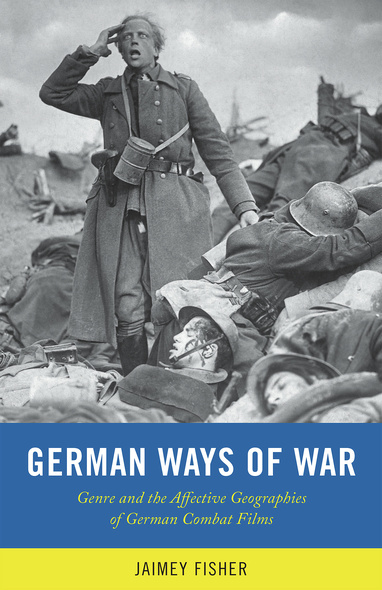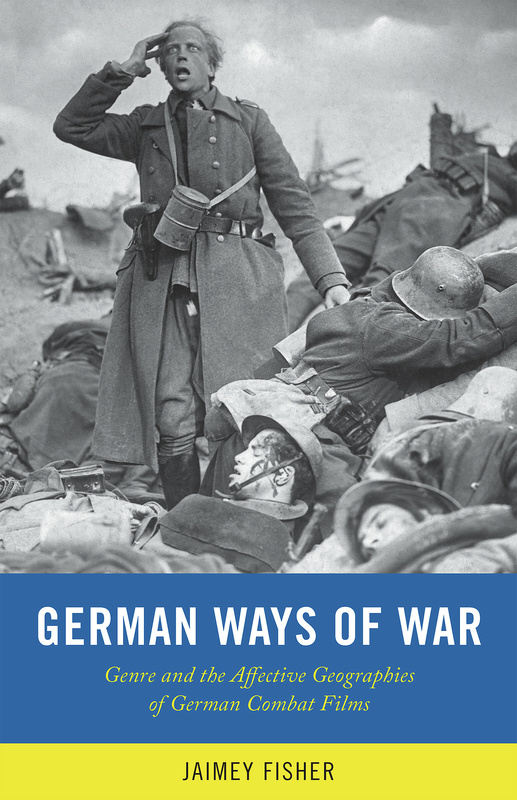
250 pages, 6 1/8 x 9 1/4
41 b&w images
Paperback
Release Date:12 Aug 2022
ISBN:9781978829176
Hardcover
Release Date:12 Aug 2022
ISBN:9781978829183
German Ways of War
The Affective Geographies and Generic Transformations of German War Films
SERIES:
War Culture
Rutgers University Press
German Ways of War deploys theories of space, mobility, and affect to investigate how war films realize their political projects. Analyzing films across the decades, from the 1910s to 2000s, German Ways of War addresses an important lacuna in media studies: while scholars have tended to focus on the similarities between cinematic looking and weaponized targeting -- between shooting a camera and discharging a gun – this book argues that war films negotiate spaces throughout that frame their violence in ways more revealing than their battle scenes. Beyond that well-known intersection of visuality and violence, German Ways of War explores how the genre frames violence within spatio-affective operations. The production of novel spaces and evocation of new affects transform war films, including the genre’s manipulation of mobility, landscape, territory, scales, and topological networks. Such effects amount to what author Jaimey Fisher terms the films’ “affective geographies” that interweave narrative-generated affects, spatial depictions, and political processes.
German Ways of War is an engaging text that charts out a captivating genre history that extends far beyond its immediate scope of German War films. The book is written as a fascinating account to how warfare changed in the twentieth century. . . The project is meticulously researched and provides invaluable political, historical, and legal documentation regarding war and peace policies in Germany.
This original study of exemplary German features probes essential dimensions of war cinema that have received little scholarly attention, its geopolitical determinations, spatial imaginaries, and affective geographies. A major contribution to film history and media studies, German Ways of War offers a comprehensive analysis of the numerous countenances and different functions this generic possibility has assumed in exemplary German productions from World War I to the postmillennial era.
German Ways of War is an engaging text that charts out a captivating genre history that extends far beyond its immediate scope of German War films. The book is written as a fascinating account to how warfare changed in the twentieth century. . . The project is meticulously researched and provides invaluable political, historical, and legal documentation regarding war and peace policies in Germany.
This original study of exemplary German features probes essential dimensions of war cinema that have received little scholarly attention, its geopolitical determinations, spatial imaginaries, and affective geographies. A major contribution to film history and media studies, German Ways of War offers a comprehensive analysis of the numerous countenances and different functions this generic possibility has assumed in exemplary German productions from World War I to the postmillennial era.
JAIMEY FISHER is a professor of German and cinema and digital media at the University of California, Davis. He is the author of Treme, Christian Petzold and Disciplining Germany: Youth, Reeducation, and Reconstruction after the Second World War.
Acknowledgements
1. Introduction: The Affective Geographies and Generic Transformations of German War Films, 1910s-2000s
2. Land into Landscape, Landscape into Territory: Transformations of Space in German War Cinema, 1914-1918 (The Diary of Dr. Hart, Sword and Hearth, Inexpiable)
3. “Landscapes of Death” and Memories of the Human: Distance, Scale, and the Double Map in the First “War-Sound-Film” (Westfront 1918, Kameradschaft)
4. Combat Films and their Aerial Spaces under the Nazi Regime (Medal of Honor, Squadron Lützow, Above Everything in the World)
5. Out of the War Mode: Demobilizing the War Genre in the Postwar Rubble-Film (Request Concert [1940], The Great Love, Ways into Twilight, The Sons of Mr. Gaspary, Birds of Migration)
6. War in the Reconstructive 1950s: Genre, Espionage, and Cold-War Subjectivities in the 1950s War Film (Canaris, Fox of Paris, Rommel Calls Cairo)
7. Conclusion: Affective Geographies of the Fading Genre (Das Boot, Downfall)
Notes
Bibliography
Index
1. Introduction: The Affective Geographies and Generic Transformations of German War Films, 1910s-2000s
2. Land into Landscape, Landscape into Territory: Transformations of Space in German War Cinema, 1914-1918 (The Diary of Dr. Hart, Sword and Hearth, Inexpiable)
3. “Landscapes of Death” and Memories of the Human: Distance, Scale, and the Double Map in the First “War-Sound-Film” (Westfront 1918, Kameradschaft)
4. Combat Films and their Aerial Spaces under the Nazi Regime (Medal of Honor, Squadron Lützow, Above Everything in the World)
5. Out of the War Mode: Demobilizing the War Genre in the Postwar Rubble-Film (Request Concert [1940], The Great Love, Ways into Twilight, The Sons of Mr. Gaspary, Birds of Migration)
6. War in the Reconstructive 1950s: Genre, Espionage, and Cold-War Subjectivities in the 1950s War Film (Canaris, Fox of Paris, Rommel Calls Cairo)
7. Conclusion: Affective Geographies of the Fading Genre (Das Boot, Downfall)
Notes
Bibliography
Index





